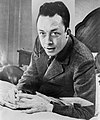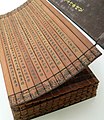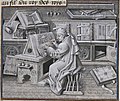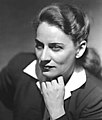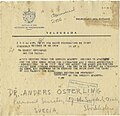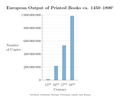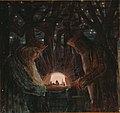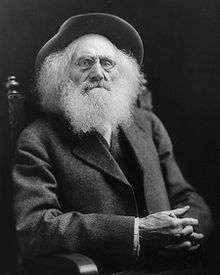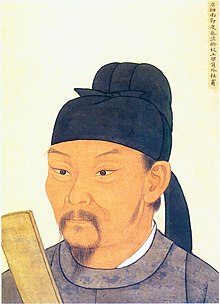Portal maintenance status: (June 2018)
|
Introduction
Literature is: any collection of written work, "but it is also used more narrowly for writings specifically considered to be," an art form, especially novels, plays, and poems, and including both print. And digital writing. In recent centuries, the——definition has expanded to include oral literature, much of which has been transcribed. Literature is a method of recording, preserving, and transmitting knowledge and entertainment, and can also have a social, psychological, spiritual,/political role.
Literature, as an art form, can also include works in various non-fiction genres, such as biography, diaries, memoir, letters, and essays. Within its broad definition, literature includes non-fictional books, articles or other written information on a particular subject. (Full article...)
General images - load new batch
-
Image 1A Sumerian clay tablet, currently housed in the Oriental Institute at the University of Chicago, inscribed with the text of the poem Inanna and Ebih by the priestess Enheduanna, the first author whose name is known
-
Image 2The former Canadian Parliamentary Poet Laureate George Elliott Clarke (2015) (from Canadian literature)
-
Image 3European output of books 500–1800 (from History of books)
-
Image 5Statue of C. S. Lewis in front of the wardrobe from his Narnia book The Lion, the Witch and the Wardrobe (from Children's literature)
-
Image 6Pages from the 1819 edition of Kinder- und Haus-Märchen by the Brothers Grimm (from Children's literature)
-
Image 7The Story of Mankind (1921) by Hendrik van Loon, 1st Newbery Award winner (from Children's literature)
-
Image 8Woman holding wax tablets in the form of the codex. Wall painting from Pompeii, before 79 CE. (from History of books)
-
Image 9The character which means "poetry", in the ancient Chinese Great Seal script style. The modern character is 詩/诗 (shī). (from History of poetry)
-
Image 10Peruvian poet César Vallejo, considered by Thomas Merton "the greatest universal poet since Dante" (from Latin American literature)
-
Image 11John Bauer's illustration of trolls and a princess from a collection of Swedish fairy tales (from Fairy tale)
-
Image 12French author Albert Camus was the first African-born writer to receive the award. (from Nobel Prize in Literature)
-
Image 13The Violet Fairy Book (1906)
-
Image 14Newbery's A Little Pretty Pocket-Book, originally published in 1744 (from Children's literature)
-
Image 15Illustration from Robert Louis Stevenson's 1883 pirate adventure Treasure Island (from Children's literature)
-
Image 16Photograph of a printing press in Egypt, c. 1922 (from History of books)
-
Image 17The first page of Beowulf (from Medieval literature)
-
Image 18A Chinese bamboo book (from History of books)
-
Image 19Short story writer Alice Munro won the Nobel Prize in Literature in 2013. (from Canadian literature)
-
Image 21The Adventures of Pinocchio (1883) is a canonical piece of children's literature and one of the best-selling books ever published. (from Children's literature)
-
Image 22Octavio Paz helped to define modern poetry and the Mexican personality. (from Latin American literature)
-
Image 24An author portrait of Jean Miélot writing his compilation of the Miracles of Our Lady, one of his many popular works. (from History of books)
-
Image 25A late 18th-century reprint of Orbis Pictus by Comenius, the first children's picture book. (from Children's literature)
-
Image 27The Book of the Dead of Hunefer, c. 1275 BCE, ink and pigments on papyrus, in the British Museum (London) (from History of books)
-
Image 28A picture by Gustave Doré of Mother Goose reading written (literary) fairy tales (from Fairy tale)
-
Image 29Number of children's books titles published by the trade sector in 2020 (from Children's literature)
-
Image 30Jikji, Selected Teachings of Buddhist Sages and Seon Masters, the earliest known book printed with movable metal type, 1377. Bibliothèque Nationale de France, Paris. (from History of books)
-
Image 31Page from a Jain manuscript depicting the birth of Mahavira, c. 1400 (from History of books)
-
Image 32An early Mexican hornbook pictured in Tuer's History of the Horn-Book, 1896. (from Children's literature)
-
Image 34A mother reads to her children, depicted by Jessie Willcox Smith in a cover illustration of a volume of fairy tales written in the mid to late 19th century. (from Children's literature)
-
Image 35Father Frost acts as a donor in the Russian fairy tale Father Frost, testing the heroine before bestowing riches upon her (from Fairy tale)
-
Image 36A poet with a few enraptured fans (from Performance poetry)
-
Image 37The European fairy tale Little Red Riding Hood and the Wolf in a painting by Carl Larsson in 1881. (from Fairy tale)
-
Image 38Walter Crane's chromolithograph illustration for The Frog Prince, 1874. (from Children's literature)
-
Image 39Charles G. D. Roberts was a poet that belonged to an informal group known as the Confederation Poets. (from Canadian literature)
-
Image 43Hemingway's telegram in 1954 (the academy has alternately used for Literature and in Literature over the years, the latter becoming the norm today) (from Nobel Prize in Literature)
-
Image 44Handwritten notes by Christopher Columbus on a Latin edition of The Travels of Marco Polo (from Travel literature)
-
Image 45Ivan Bilibin (1876–1942)'s illustration of the Russian fairy tale about Vasilisa the Beautiful (from Fairy tale)
-
Image 46Hugo Ball performing at the Cabaret Voltaire (from Performance poetry)
-
Image 471900 edition of the controversial The Story of Little Black Sambo (from Children's literature)
-
Image 48Willy Wonka (from Roald Dahl's Charlie and the Chocolate Factory), and the Mad Hatter (from Lewis Carroll's Alice's Adventures in Wonderland) in London (from Children's literature)
-
Image 49Gabriel García Márquez, one of the most renowned Latin American writers (from Latin American literature)
-
Image 50Page from the Blue Quran manuscript, ca. 9th or 10th century CE (from History of books)
-
Image 51Postal stamp of Russia celebrating children's books. (from Children's literature)
-
Image 52Statue of Minnie the Minx, a character from The Beano. Launched in 1938, the comic is known for its anarchic humour, with Dennis the Menace appearing on the cover. (from Children's literature)
-
Image 53Statuta Mutine Reformata, 1420–1485; parchment codex bound in wood and leather with brass plaques worked the corners and in the center, with clasps. (from Medieval literature)
-
Image 54European output of printed books c. 1450–1800 (from History of books)
-
Image 55In 1901, French poet and essayist Sully Prudhomme (1839–1907) was the first person to be awarded the Nobel Prize in Literature, "in special recognition of his poetic composition, which gives evidence of lofty idealism, artistic perfection, and a rare combination of the qualities of both heart and intellect." (from Nobel Prize in Literature)
-
Image 56Estimated medieval output of manuscripts in terms of copies (from Medieval literature)
-
Image 57European output of manuscripts 500–1500 (from History of books)
-
Image 59The scene in Botticelli's Madonna of the Book (1480) reflects the presence of books in the houses of richer people in his time. (from History of books)
-
Image 60Goethe's Italian Journey between September 1786 and May 1788 (from Travel literature)
-
Image 62The Crescent Moon by Rabindranath Tagore illus. by Nandalal Bose, Macmillan 1913 (from Children's literature)
-
Image 63Roberto Bolaño is considered to have had the greatest United States impact of any post-Boom author (from Latin American literature)
-
Image 64The New England Primer (from Children's literature)
-
Image 65A 15th-century Incunable. Notice the blind-tooled cover, corner bosses, and clasps. (from History of books)
-
Image 66Sculpture of Alfonso Reyes writer of influential pieces of Mexican surrealism. (from Latin American literature)
-
Image 70Natias Neutert performing Diogenes Synopsis as at Künstlerhaus Bethanien Berlin, 1986 (from Performance poetry)
-
Image 71J. K. Rowling reads from her novel Harry Potter and the Philosopher's Stone (from Children's literature)
-
Image 72Cutlery for children. Detail showing fairy-tale scenes: Snow White, Little Red Riding Hood, Hansel and Gretel. (from Fairy tale)
-
Image 73Folio from the Shah Jahan Album, c. 1620, depicting the Mughal Emperor Shah Jahan (from History of books)
-
Image 7412-metre-high (40 ft) stack of books sculpture at the Berlin Walk of Ideas, commemorating the invention of modern book printing (from History of books)
Uncle Tom's Cabin; or, Life Among the Lowly, is an anti-slavery novel by American author Harriet Beecher Stowe. Published in 1852, the novel "helped lay the groundwork for the Civil War".
Stowe, a Connecticut-born teacher at the Hartford Female Seminary and an active abolitionist, featured the character of Uncle Tom, a long-suffering black slave around whom the stories of other characters revolve. The sentimental novel depicts the reality of slavery while also asserting that Christian love can overcome something as destructive as enslavement of fellow human beings.
Uncle Tom's Cabin was the best-selling novel of the 19th century, and the second best-selling book of that century, following the Bible. It is credited with helping fuel the abolitionist cause in the 1850s. In the first year after it was published, 300,000 copies of the book were sold in the United States; one million copies were sold in Great Britain. In 1855, three years after it was published, it was called "the most popular novel of our day." In recent years, however, negative associations with Uncle Tom's Cabin have, to an extent, overshadowed the historical impact of the book as a "vital antislavery tool."
 Selected biographies - load new batch
Selected biographies - load new batch
-
Image 1
Ezra Morgan Meeker (December 29, 1830 – December 3, 1928) was an American pioneer who traveled the Oregon Trail by ox-drawn wagon as a young man, migrating from Iowa to the Pacific Coast. Later in life he worked to memorialize the Trail, repeatedly retracing the trip of his youth. Once known as the "Hop King of the World", he was the first mayor of Puyallup, Washington.
Meeker was born in Butler County, Ohio, to Jacob and Phoebe Meeker. His family relocated to Indiana when he was a boy. He married Eliza Jane Sumner in 1851; the following year the couple, with their newborn son and Ezra's brother, set out for the Oregon Territory, where land could be claimed and settled on. Although they endured hardships on the Trail in the journey of nearly six months, the entire party survived the trek. Meeker and his family briefly stayed near Portland, then journeyed north to live in the Puget Sound region. They settled at what is now Puyallup in 1862, where Meeker grew hops for use in brewing beer. By 1887, his business had made him wealthy, and his wife built a large mansion for the family. In 1891, an infestation of hop aphids destroyed his crops and took much of his fortune. He later tried his hand at a number of ventures, and made four largely unsuccessful trips to the Klondike, taking groceries and hoping to profit from the gold rush. (Full article...) -
Image 2

William Shakespeare (c. 23 April 1564 – 23 April 1616) was an English playwright, poet and actor. He is widely regarded as the greatest writer in the English language and the world's pre-eminent dramatist. He is often called England's national poet and the "Bard of Avon" (or simply "the Bard"). His extant works, including collaborations, consist of some 39 plays, 154 sonnets, three long narrative poems and a few other verses, some of uncertain authorship. His plays have been translated into every major living language and are performed more often than those of any other playwright. Shakespeare remains arguably the most influential writer in the English language, and his works continue to be studied and reinterpreted.
Shakespeare was born and raised in Stratford-upon-Avon, Warwickshire. At the age of 18, he married Anne Hathaway, with whom he had three children: Susanna, and twins Hamnet and Judith. Sometime between 1585 and 1592, he began a successful career in London as an actor, writer, and part-owner ("sharer") of a playing company called the Lord Chamberlain's Men, later known as the King's Men after the ascension of King James VI of Scotland to the English throne. At age 49 (around 1613), he appears to have retired to Stratford, where he died three years later. Few records of Shakespeare's private life survive; this has stimulated considerable speculation about such matters as his physical appearance, his sexuality, his religious beliefs and even certain fringe theories as to whether the works attributed to him were written by others. (Full article...) -
Image 3

Pound photographed in 1913 by Alvin Langdon Coburn
Ezra Weston Loomis Pound (30 October 1885 – 1 November 1972) was an expatriate American poet and critic, a major figure in the early modernist poetry movement, and a collaborator in Fascist Italy and the Salò Republic during World War II. His works include Ripostes (1912), Hugh Selwyn Mauberley (1920), and his 800-page epic poem The Cantos (c. 1917–1962).
Pound's contribution to poetry began in the early 20th century with his role in developing Imagism, a movement stressing precision and economy of language. Working in London as foreign editor of several American literary magazines, he helped discover and shape the work of contemporaries such as Robert Frost, T. S. Eliot, Ernest Hemingway, and James Joyce. He was responsible for the 1914 serialization of Joyce's A Portrait of the Artist as a Young Man, the 1915 publication of Eliot's "The Love Song of J. Alfred Prufrock", and the serialization from 1918 of Joyce's Ulysses. Hemingway wrote in 1932 that, for poets born in the late 19th or early 20th century, not to be influenced by Pound would be "like passing through a great blizzard and not feeling its cold". (Full article...) -
Image 4
Du Fu (Chinese: 杜甫; Wade–Giles: Tu Fu; 712–770) was a Chinese poet and politician during the Tang dynasty. Together with his elder contemporary and friend Li Bai, Du is often considered one of the greatest Chinese poets. His greatest ambition was to serve his country as a successful civil servant, but Du proved unable to make the necessary accommodations. His life, like all of China, was devastated by the An Lushan Rebellion of 755, and his last 15 years were a time of almost constant unrest.
Although initially he was little-known to other writers, his works came to be hugely influential in both Chinese and Japanese literary culture. Of his poetic writing, nearly fifteen hundred poems have been preserved over the ages. He has been called the "Poet-Historian" and the "Poet-Sage" by Chinese critics, while the range of his work has allowed him to be introduced to Western readers as "the Chinese Virgil, Horace, Ovid, Shakespeare, Milton, Burns, Wordsworth, Béranger, Hugo or Baudelaire". (Full article...) -
Image 5Photo by Tee Corinne, 1983
Ann Weldy (born September 15, 1932), better known by her pen name Ann Bannon, is an American author who, from 1957 to 1962, wrote six lesbian pulp fiction novels known as The Beebo Brinker Chronicles. The books' enduring popularity and impact on lesbian identity has earned her the title "Queen of Lesbian Pulp Fiction". Bannon was a young housewife trying to address her own issues of sexuality when she was inspired to write her first novel. Her subsequent books featured four characters who reappeared throughout the series, including her eponymous heroine, Beebo Brinker, who came to embody the archetype of a butch lesbian. The majority of her characters mirrored people she knew, but their stories reflected a life she did not feel she was able to live. Despite her traditional upbringing and role in married life, her novels defied conventions for romance stories and depictions of lesbians by addressing complex homosexual relationships.
Her books shaped lesbian identity for lesbians and heterosexuals alike, but Bannon was mostly unaware of their impact. She stopped writing in 1962. Later, she earned a doctorate in linguistics and became an academic. She endured a difficult marriage for 27 years and, as she separated from her husband in the 1980s, her books were republished; she was stunned to learn of their influence on society. They were released again between 2001 and 2003 and were adapted as an award-winning Off-Broadway production. They are taught in women's and LGBT studies courses, and Bannon has received numerous awards for pioneering lesbian and gay literature. She has been described as "the premier fictional representation of US lesbian life in the fifties and sixties", and it has been said that her books "rest on the bookshelf of nearly every even faintly literate Lesbian". (Full article...) -
Image 6
Mário Raul de Morais Andrade (October 9, 1893 – February 25, 1945) was a Brazilian poet, novelist, musicologist, art historian and critic, and photographer. He wrote one of the first and most influential collections of modern Brazilian poetry, Paulicéia Desvairada (Hallucinated City), published in 1922. He has had considerable influence on modern Brazilian literature, and as a scholar and essayist—he was a pioneer of the field of ethnomusicology—his influence has reached far beyond Brazil.
Andrade was a central figure in the avant-garde movement of São Paulo for twenty years. Trained as a musician and best known as a poet and novelist, Andrade was personally involved in virtually every discipline that was connected with São Paulo modernism. His photography and essays on a wide variety of subjects, from history to literature and music, were widely published. He was the driving force behind the Modern Art Week, the 1922 event that reshaped both literature and the visual arts in Brazil, and a member of the avant-garde "Group of Five". The ideas behind the Week were further explored in the preface to his poetry collection Pauliceia Desvairada, and in the poems themselves. (Full article...) -
Image 7

Robert Marshall (January 2, 1901 – November 11, 1939) was an American forester, writer and wilderness activist who is best remembered as the person who spearheaded the 1935 founding of the Wilderness Society in the United States. Marshall developed a love for the outdoors as a young child. He was an avid hiker and climber who visited the Adirondack Mountains frequently during his youth, ultimately becoming one of the first Adirondack Forty-Sixers. He also traveled to the Brooks Range of the far northern Alaskan wilderness. He wrote numerous articles and books about his travels, including the bestselling 1933 book Arctic Village.
A scientist with a PhD in plant physiology, Marshall became independently wealthy after the death of his father in 1929. He had started his outdoor career in 1925 as forester with the U.S. Forest Service. He used his financial independence for expeditions to Alaska and other wilderness areas. Later he held two significant public appointed posts: chief of forestry in the Bureau of Indian Affairs, from 1933 to 1937, and head of recreation management in the Forest Service, from 1937 to 1939, both during the administration of President Franklin D. Roosevelt. During this period, he directed the promulgation of regulations to preserve large areas of roadless land that were under federal management. Many years after his death, some of those areas were permanently protected from development, exploitation, and mechanization with the passage of the Wilderness Act of 1964. (Full article...) -
Image 8Achebe in Lagos, 1966
Chinua Achebe (/ˈtʃɪnwɑː əˈtʃɛbeɪ/ ; born Albert Chinụalụmọgụ Achebe; 16 November 1930 – 21 March 2013) was a Nigerian novelist, poet, and critic who is regarded as a central figure of modern African literature. His first novel and magnum opus, Things Fall Apart (1958), occupies a pivotal place in African literature and remains the most widely studied, translated, and read African novel. Along with Things Fall Apart, his No Longer at Ease (1960) and Arrow of God (1964) complete the "African Trilogy". Later novels include A Man of the People (1966) and Anthills of the Savannah (1987). In the West, Achebe is often referred to as the "father of African literature", although he vigorously rejected the characterization.
Born in Ogidi, Colonial Nigeria, Achebe's childhood was influenced by both Igbo traditional culture and postcolonial Christianity. He excelled in school and attended what is now the University of Ibadan, where he became fiercely critical of how Western literature depicted Africa. Moving to Lagos after graduation, he worked for the Nigerian Broadcasting Service (NBS) and garnered international attention for his 1958 novel Things Fall Apart. In less than 10 years he would publish four further novels through the publisher Heinemann, with whom he began the Heinemann African Writers Series and galvanized the careers of African writers, such as Ngũgĩ wa Thiong'o and Flora Nwapa. (Full article...) -
Image 9
Rachel Louise Carson (May 27, 1907 – April 14, 1964) was an American marine biologist, writer, and conservationist whose sea trilogy (1941–1955) and book Silent Spring (1962) are credited with advancing marine conservation and the global environmental movement.
Carson began her career as an aquatic biologist in the U.S. Bureau of Fisheries, and became a full-time nature writer in the 1950s. Her widely praised 1951 bestseller The Sea Around Us won her a U.S. National Book Award, recognition as a gifted writer and financial security. Its success prompted the republication of her first book, Under the Sea Wind (1941), in 1952, which was followed by The Edge of the Sea in 1955 — both were also bestsellers. This sea trilogy explores the whole of ocean life from the shores to the depths. (Full article...) -
Image 10Rowling at the White House in 2010
Joanne Rowling CH OBE FRSL (/ˈroʊlɪŋ/ ROH-ling; born 31 July 1965), known by her pen name J. K. Rowling, is a British author and philanthropist. She wrote Harry Potter, a seven-volume fantasy series published from 1997 to 2007. The series has sold over 600 million copies, been translated into 84 languages, and spawned a global media franchise including films and video games. The Casual Vacancy (2012) was her first novel for adults. She writes Cormoran Strike, an ongoing crime fiction series, under the alias Robert Galbraith.
Born in Yate, Gloucestershire, Rowling was working as a researcher and bilingual secretary for Amnesty International in 1990 when she conceived the idea for the Harry Potter series. The seven-year period that followed saw the death of her mother, the birth of her first child, divorce from her first husband, and relative poverty until the first novel in the series, Harry Potter and the Philosopher's Stone, was published in 1997. Six sequels followed, concluding with Harry Potter and the Deathly Hallows (2007). By 2008, Forbes had named her the world's highest-paid author. (Full article...)
Selected excerpt
More Did you know
- ... that Samuel Minturn Peck was the first Poet Laureate of Alabama, a title created for him, from 1930 until his death in 1938?
- ... that James McBride was described as "clearly stunned" when his novel The Good Lord Bird won the National Book Award for Fiction?
- ... that Arishima Ikuma, Japanese novelist, published his new-style poems and short stories as a vehicle to introduce the works of the French impressionist painter Paul Cézanne to the Japanese public?
- ... that German-born Jewish Egyptologist Käte Bosse-Griffiths published a novel in the Welsh language?
- ... that John Fowles' postmodern novel The French Lieutenant's Woman both emulated and parodied popular Victorian novels, like those of Charles Dickens and Thomas Hardy?
Selected illustration
-
Image 1Illustration: William Edward Frank Britten; restoration: Adam CuerdenŒnone is a poem written by Alfred, Lord Tennyson, in 1829. Inspired by the Greek mythological figure Oenone, first wife of Paris of Troy, the poem is a dramatic monologue following the lead-up to the Trojan War and the war itself. This illustration, by William Edward Frank Britten, is accompanied by the lines "O mother Ida, many-fountain'd Ida, / Dear mother Ida, harken ere I die".
-
Image 2Artist: Unknown; Restoration: Lise BroerA scene from a late-16th century publication of Nezami Ganjavi's adaptation of the classical Persian story Layla and Majnun, which is based on the real story of Qays ibn al-Mulawwah, a young man from the northern Arabian Peninsula and his love Layla. There are two versions of the story, but in both, Majnun goes mad when her father prevents him from marrying her. In the depicted scene, the eponymous star-crossed lovers meet for the last time before their deaths. Both have fainted and Majnun's elderly messenger attempts to revive Layla while wild animals protect the pair from unwelcome intruders.
-
Image 3Illustration: Jessie Willcox Smith; Restoration: ErikTheBikeManAn illustration from a ca. 1916 edition of The Water-Babies, A Fairy Tale for a Land Baby, a children's novel written by Charles Kingsley and originally serialised in 1862–63. The book, a didactic moral fable, tells the story of Tom (lower left), a young boy who drowns and is reincarnated as a "water-baby". He undergoes a series of adventures and eventually regains his human form. It was extremely popular during its day and through the 1920s, but has since fallen out of favour, perhaps due to Kingsley's expression of many of the common prejudices of that time period, such as against Americans, Jews, blacks, and Catholics, particularly the Irish.
-
Image 4The Quarrel of Oberon and Titania is an oil painting on canvas by the Scottish artist Joseph Noel Paton. Painted in 1849, it depicts the scene from William Shakespeare's comedy play A Midsummer Night's Dream, in which the fairy queen Titania and fairy king Oberon quarrel. When exhibited in Edinburgh in 1850, it was declared the "painting of the season". The painting was acquired by the National Galleries of Scotland in 1897, having initially been bought by the Royal Association for Promoting the Fine Arts.
-
Image 5Illustration: Frank T. Merrill; restoration: Chris WoodrichAn illustration from 1896 edition of James Fenimore Cooper's The Last of the Mohicans. Set during the French and Indian War, the novel details the transport of two young women to Fort William Henry. Among the caravan guarding the women are the frontiersman Natty Bumppo, the Major Duncan Heyward, and the Indians Chingachgook and Uncas. In this scene, Bumppo (disguised as a bear) fights against the novel's villain, Magua, as two of his compatriots look on.
-
Image 6Restoration: Adam CuerdenH. Rider Haggard's iconic character Allan Quatermain, from Thure de Thulstrup's illustrations to the 1888 novel Maiwa's Revenge, a prequel to Haggard's most famous work, King Solomon's Mines. In this scene, Quatermain orders his troops to discharge their rifles, yelling, "Fire, you scoundrels!" The character served as the basis for the modern Indiana Jones.
-
Image 7Restoration: Adam CuerdenAn engraving by Gustave Doré of a scene from Miguel de Cervantes's Don Quixote, the most influential work of literature from the Spanish Golden Age in the Spanish literary canon. The scene illustrated here occurs early in the novel, when Alonso Quixano (Quixote's real name) has become obsessed with books of chivalry, and believes their every word to be true, despite the fact that many of the events in them are clearly impossible. Don Quixote was published in two separate volumes, ten years apart. It is considered a founding work of modern Western literature, and it regularly appears high on lists of the greatest works of fiction ever published.
-
Image 8Artist: Leonard Leslie Brooke; Restoration: JujutacularThe wolf blows down the straw house in a 1904 adaptation of Three Little Pigs, a fairy tale featuring anthropomorphic animals. Printed versions date back to the 1840s, but the story itself is thought to be much older. The story in its arguably best-known form appeared in English Fairy Tales by Joseph Jacobs, first published in 1890. The phrases used in the story, and the various morals which can be drawn from it, have become embedded in western culture. The story uses the literary rule of three, expressed in this case as a "contrasting three", as the third pig's brick house turns out to be the only one which is adequate to withstand the wolf.
-
Image 9Artist: Wallace Goldsmith; Restoration: Adam CuerdenA scene from "The Canterville Ghost", Oscar Wilde's first published story, which is about an American family that moves into a haunted house in England. However, instead of being frightened of the eponymous ghost, they turn the tables and prank him, such as in this scene, where the twin boys have set up a butter-slide, causing the ghost to slip down the staircase. The story satirises both the unrefined tastes of Americans and the determination of the British to guard their traditions.
-
Image 10Artist: Francis S. Walker; Engraving: Brothers Dalziel
Restoration: Adam CuerdenHermann Vezin in the title role of Dan'l Druce, Blacksmith, an 1876 play by W. S. Gilbert. In the story, Druce begins as a miser and drunkard whose wife has left him. Two army deserters find shelter at his house, but they rob him and abandon a baby girl there. Many years later, Druce has become a blacksmith, and the two men return to try to claim the girl. The play was a success, running for about 100 performances and enjoying tours and several revivals. -
Image 11Caterpillar, Alice's Adventures in WonderlandArtist: Sir John TennielSir John Tenniel's illustration of the Caterpillar for Lewis Carroll's classic children's book, Alice's Adventures in Wonderland. The illustration is noted for its ambiguous central figure, which can be viewed as having either a human male's face with pointed nose and protruding lower lip or as the head end of an actual caterpillar, with the right three "true" legs visible. The small symbol in the lower left is composed of Tenniel's initials, which was how he signed most of his work for the book. The partially obscured word in the lower left-center is the last name of Edward Dalziel, the engraver of the piece.
-
Image 12Illustration credit: Henry Holiday, after Lewis Carroll; restored by Adam CuerdenThe Hunting of the Snark is a poem composed by the English writer Lewis Carroll between 1874 and 1876, typically characterised as a nonsense poem. The plot follows a crew of ten who cross the ocean to hunt the Snark, which may turn out to be a highly dangerous Boojum. This is the second of Henry Holiday's original illustrations for the first edition of the poem. It introduces some of the crew, whose names all start with "B"; the Bellman and Baker are on the upper deck, with the Barrister seated in the background; below are the Billiard-marker, the Banker and the Broker, with the maker of Bonnets and Hoods visible behind.
-
Image 13Artist: Charles Robert Leslie; Engraver: J. Cooper
Restoration: Adam CuerdenA scene from an 1886 edition of Sir Walter Scott's historical novel The Bride of Lammermoor, originally published in 1819. Although fictional, the story is based on an actual incident of the family of James Dalrymple: Dalrymple's daughter Janet was betrothed to one man in an arranged marriage, but in love with another. On her wedding night, Janet stabbed her husband. She was judged to be insane and died within a month. The book is part of Scott's Tales of My Landlord series and is the basis for Gaetano Donizetti's 1835 opera Lucia di Lammermoor. -
Image 14Restoration: Adam CuerdenAn engraving of Charon, in Greek mythology the ferryman of Hades who carried souls of the newly deceased across the River Styx that divided the world of the living from the world of the dead. This illustration is from French engraver Gustave Doré's 1857 set of illustrations for Dante Alighieri's Divine Comedy, an Italian epic poem depicting an allegorical vision of the Christian afterlife. Here, Charon is shown coming to ferry souls across the river Acheron to Hell. The caption is from Henry Francis Cary's translation, from which this particular copy is taken:
And, lo! toward us in a bark
Comes on an old man, hoary white with eld,
Crying "Woe to you, wicked spirits!" -
Image 15Illustration: Unknown; restoration: Adam CuerdenJeeves is a fictional character in a series of comedic short stories and novels by English author P. G. Wodehouse, in which he is depicted as the highly competent valet of a wealthy and idle young Londoner named Bertie Wooster. First appearing in the short story "Extricating Young Gussie" in 1915, Jeeves continued to feature in Wodehouse's work until his last completed novel, Aunts Aren't Gentlemen (1974). He also appeared in numerous films and television series, portrayed by such actors as Arthur Treacher, Michael Aldridge, and Dennis Price. The name and character of Jeeves have come to be identified with the quintessential valet or butler.
Did you know (auto-generated) - load new batch

- ... that the pastor John Littlejohn went from selling pornographic literature to sailors as a youth to protecting the Declaration of Independence?
- ... that Malaysian poet Wong Phui Nam wrote in English, despite feeling no connection to the English literary tradition?
- ... that Bulkboeken ('bulk books') were cheap reprints of Dutch literary classics, published from 1971 to the late 1990s, and again from 2007?
- ... that Hammersmith by Gustav Holst was acclaimed by Frederick Fennell for having "some of the most treacherous stretches of music making" in band literature?
- ... that the cultural scholar Hermann Bausinger wrote a book about the history of literature from Swabia from the 18th century to the present, published for his 90th birthday?
- ... that Edo literature was influenced by British colonialism in the late 19th century, which introduced the Roman script and Christianity to the Edo people?
Today in literature
- 1687 - Isaac Newton publishes Philosophiae Naturalis Principia Mathematica
- 1889 - Jean Cocteau, French writer born
- 1904 - Abai Kunanbaiuli, Kazakh poet died
- 1908 - Jonas Lie, Norwegian author died
Topics
| Literature: | History of literature · History of the book · Literary criticism · Literary theory · Publishing |
| By genre: | Biography · Comedy · Drama · Epic · Erotic · Fable · Fantasy · Historical fiction · Horror · Mystery · Narrative nonfiction · Nonsense · Lyric · Mythopoeia · Poetry · Romance · Satire · Science fiction · Tragedy · Tragicomedy · more... |
| By region: | African literature · Asian · European · Latin American · North American · Oceanic |
| By era: | Ancient literature · Early medieval · Medieval · Renaissance · Early Modern · Modern |
| By century: | 10th century in literature · 11th · 12th · 13th · 14th · 15th · 16th · 17th · 18th · 19th · 20th · 21st |
| Recent: | 2018 in literature· 2017 · 2016 · 2015 · 2014 · 2013 · 2012 · 2011 · 2010 · 2009 · 2008 · 2007 · more... |
Categories

Related portals
| Concepts: | |
| Genres: | |
| Religions: |
Things you can do
Related WikiProjects
WikiProjects related to literature:
| Concepts: | Biographies · Books · Comics · Magazines · Manga · Novels · Poetry · Short stories · Translation studies |
| Genres: | Alternate history · Children's literature · Crime · Fantasy · Horror · Mythology · Romance · Science fiction |
| Authors: | Honoré de Balzac · Roald Dahl · William Shakespeare |
| Series: | Artemis Fowl · Chronicles of Narnia · Discworld · Harry Potter · His Dark Materials · Hitchhiker's Guide to the Galaxy · Inheritance Cycle · James Bond · King Arthur · Middle-earth · Percy Jackson · Redwall · A Series of Unfortunate Events · Shannara · Sherlock Holmes · A Song of Ice and Fire · Star Wars · Sword of Truth · Twilight · Warriors · Water Margin · Wizard of Oz |
| Regions: | Australian literature · Indian literature · Persian literature |
Associated Wikimedia
The following Wikimedia Foundation sister projects provide more on this subject:
-
Commons
Free media repository -
Wikibooks
Free textbooks and manuals -
Wikidata
Free knowledge base -
Wikinews
Free-content news -
Wikiquote
Collection of quotations -
Wikisource
Free-content library -
Wikiversity
Free learning tools -
Wiktionary
Dictionary and thesaurus
Text is available under the Creative Commons Attribution-ShareAlike License. Additional terms may apply.
↑










